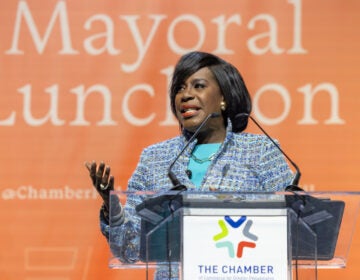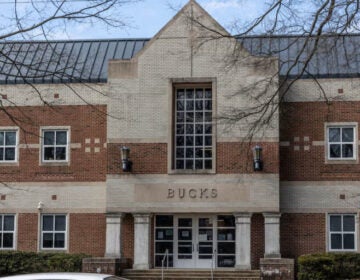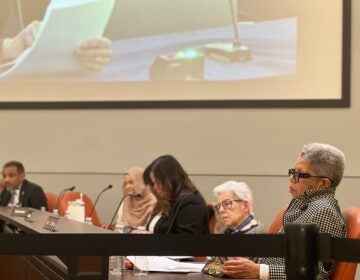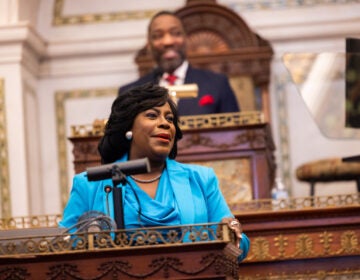Parker’s first budget proposal as Philadelphia mayor includes a boost to city education, push for year-round schools
Parker’s first budget proposal includes $24 million for the 2024-2025 school year.
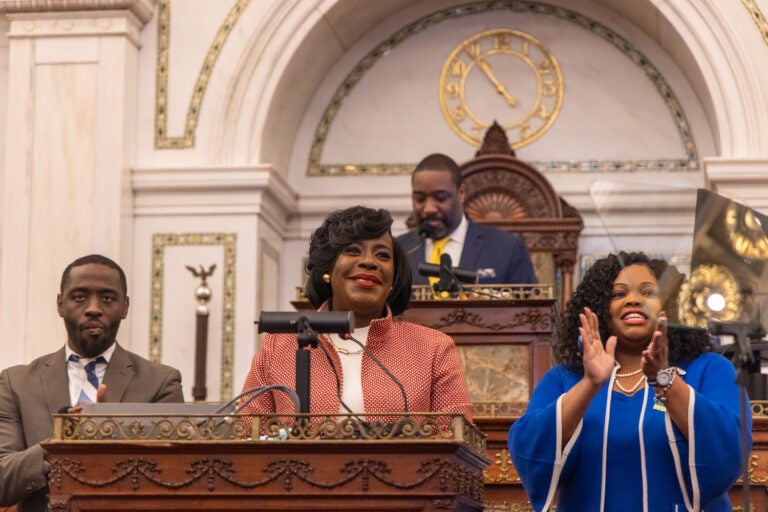
Philadelphia Mayor Cherelle Parker delivered her first budget address to council at City Hall on March 14, 2024. (Kimberly Paynter/WHYY)
Mayor Cherelle Parker’s first budget as Philadelphia mayor includes $24 million for the city’s school district next year and a host of new initiatives that should benefit public education and workforce development.
“The days of settling for crumbs are over. Our students deserve a full loaf, and they are going to get it,” Parker told City Council members during her budget address last week, when she unveiled the $6.3 billion proposal to the public.
The budget would allocate $140 million for public education over five years, including $129 million for the school district.
Parker said she plans to work with Superintendent Tony B. Watlington, Sr., to roll out full-day, year-round schooling, offering educational enrichment as part of a pilot program in 20 schools this fall. She said it would provide educational enrichment by focusing on the city’s fast-growing industries, such as life sciences, biotechnology, and building trades. According to Parker, the Philadelphia Building Trades, led by Ryan Boyer, would be a part of rebuilding the school’s infrastructure.
“Our students deserve to learn in safe healthy facilities for 21st-century learning. We have to modernize some schools and build new ones,” Parker said. “Let’s imagine our building trades giving our students on the job training in restoring and rebuilding schools, and then welcoming them into a union workforce.”
In addition, Parker said the city would collaborate with the Community College of Philadelphia and the school district to create its first “municipal academy,” to train high school students for hard-to-fill city positions. The academy will also be open to anyone, including city workers, seeking to upgrade their job status. To keep young Philadelphians engaged, Parker called for $3.2 million for youth sports programs.
Councilmember Anthony Phillips said the school district will now present its expected funding needs at the body’s upcoming budget hearings, where both the mayor and school district’s funding proposals will be considered and ultimately negotiated.
“There will be funding for year-round schooling, and that is near and dear to me because, as a former director of youth out-of-school-type programs, I can say that they save lives,” Phillips said. “Making sure that young people have really robust programming … will help us with violence prevention.”
Sean Vereen, co-president of Heights Philadelphia, said Parker’s commitment to more education funding, workforce development and young people is exciting. Heights Philadelphia is a nonprofit group that promotes educational and economic opportunities in underserved communities. Vereen also liked the idea of a municipal academy.
“This, to me, is really smart. It utilizes CCP and the city government as an access point to economic opportunity to access middle-class jobs,” Vereen said. “It’s the right kind of thinking, and we need more [of that] kind of thinking … The poverty in this city holds all of us back.”
Parker said that last year, the Commonwealth Court ruled that the state’s funding formula was illegally underfunding urban school districts like Philadelphia. So, the state recommended an infusion of $1.4 billion for the Philadelphia schools over the next seven years.
“Gov. Shapiro proposed $242 more in education funds in Philadelphia this year, and we are going to continue to advocate vigorously for public education in Harrisburg,” she said.
In January, Watlington said the school district faced about a $400 million deficit in its $4.5 billion budget this year with the loss of $1.2 billion in federal pandemic relief funds, absent any new funds.
Nevertheless, Watlington, who was in council chambers for Thursday’s address, praised Parker’s dedication to students. “The future of Philadelphia relies on the fiscal health of our school system,” he said.
U.S. Rep. Dwight Evans, who was also present at the address, agreed that Parker’s intergovernmental approach would be “essential” to provide the necessary school funding. He promised to support that effort in Congress.
In a related matter, Parker announced a tentative agreement between Council President Kenyatta Johnson, City Solicitor Rene Garcia and Sheriff Rochelle Bilal to resume sales of abandoned properties with delinquent taxes, which will mean additional funds for the district.
“We know that the lack of tax sales has cost the city and the school district an estimated $35 million in tax revenue and those dollars could have been invested in classrooms, rec centers or building affordable homes,” Parker said. It’s expected that the tax sales will begin by July 1.
“As for public education, our goals are high,” Parker said. “We are going to innovate, to provide a world class education for students of all ages and backgrounds.”

Get daily updates from WHYY News!
WHYY is your source for fact-based, in-depth journalism and information. As a nonprofit organization, we rely on financial support from readers like you. Please give today.


